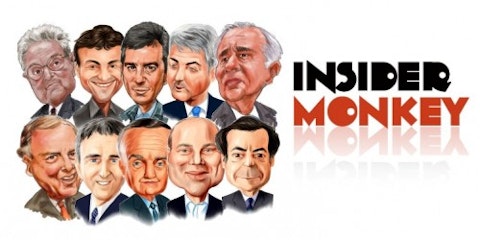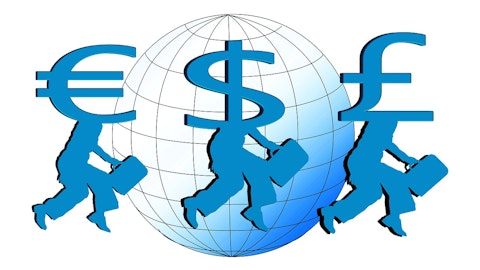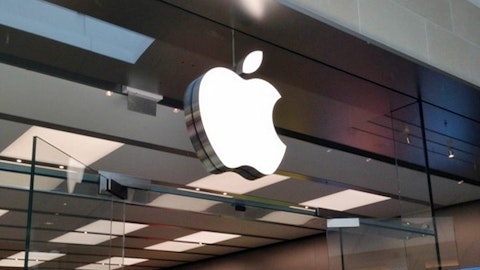As the third quarter has ended, it’s time to take a look back at the past three months and see if the hedge funds were right about their top picks heading into the past trimester. With this in mind, we have compiled the returns of the ten most popular stocks among the more than 700 hedge funds that we have in our database. The average return of these ten stocks stands at slightly above 1% during the third quarter which is 7 percentage points better than the return of the S&P 500 ETF (SPY), which lost around 6% during the same period.
The recent market turmoil did not pass unnoticed for most hedge funds, since many of these most popular stocks had a significant negative return during the third quarter. You probably read about the recent poor performance of Greenlight Capital, Pershing Square, Third Point, Glenview Capital and JANA Partners, but you probably haven’t heard about Sio Capital’s 8.9% year-to-date gains (we track Sio Capital’s moves in our monthly newsletter). Our calculations also show that VHCP Management’s long stock positions in larger-cap companies returned 17.4% during the third quarter (see the third quarter’s best performing hedge funds). The truth is the media loves to cover the misery of billionaire hedge fund managers, and hedge funds, on average, are performing better than index funds this year (I haven’t seen any headlines about this fact).

Why do we think that it’s important to follow the stocks in which some of the best money managers invest their capital? The reason is simple, we track these stocks in order to benefit from the stock-picking skills and high levels of expertise of the hedge fund industry overall. These investors usually employ complex analysis techniques and commit a lot of resources to identifying their next investment, while their long-term focus allows us to emulate them. However, our research has shown that, contrary to popular opinion, hedge funds’ most popular picks are not their best picks, because even though they carry a lower risk, they are more efficiently priced and don’t have a lot of intrinsic value that smaller investors could benefit from. On the other hand, their top small-cap ideas have performed very well in our backtests spanning through the period between 1999 and 2012 (see more details about our backtests), and showed monthly returns of nearly one percentage point above the market on average. Our strategy that involves imitating the 15 most popular small-cap picks among hedge funds has returned some 118% since August 2012, beating the SPY by around 60 percentage points.
Follow General Motors Co (NYSE:GM)
Follow General Motors Co (NYSE:GM)
Receive real-time insider trading and news alerts
So, let’s take a closer look at the performance of the hedge funds’ top ten picks, starting with General Motors Company (NYSE:GM), which ranked on the 10th spot with 104 funds from our database reporting positions valued at $5.78 billion in aggregate. These funds held 10.90% of the company’s outstanding stock at the end of June, while over the third quarter the stock lost 8.8%. However, the decline might be viewed as a development that has made the stock more attractive, since General Motors Company (NYSE:GM)’s recently-announced development plans signal more growth in the upcoming years.
The company plans to cut costs and use the savings to develop new vehicles, including an autonomous car, whose first model might be released as soon as next year. The company has benefited from strong sales amid low gasoline prices and a strengthening smart money confidence also suggests that General Motors Company (NYSE:GM) is worth betting on for the long-run. Billionaires Warren Buffett, David Einhorn and David Tepper are among the largest shareholders of GM as of the end of June, while Einhorn, who re-initiated a stake earlier this year, said in his second quarter letter to investors that “there is an excellent chance that GM” could beat the consensus earnings estimates for the current year (see details).
In Time Warner Cable Inc (NYSE:TWC), whose stock edged up by 1.10% during the third quarter, 105 funds reported stakes worth $14.41 billion in aggregate, equal to 28.60% of its outstanding stock as of the end of June. Most of these funds probably have bet on the upcoming merger with Charter Communications, Inc. (NASDAQ:CHTR), which has been recently approved by Time Warner Cable Inc (NYSE:TWC)’s shareholders and currently awaits regulatory approval from the Federal Communications Commission. John Paulson’s Paulson & Co. and Eric W. Mandelblatt’s Soroban Capital Partners held the largest stakes in Time Warner Cable Inc (NYSE:TWC) among the funds we track, disclosing ownership of 8.12 million and 7.62 million shares respectively.
Follow Time Warner Cable Inc. (NYSE:TWC)
Follow Time Warner Cable Inc. (NYSE:TWC)
Receive real-time insider trading and news alerts
Microsoft Corporation (NASDAQ:MSFT) was one of the top tech picks among hedge funds, after 107 funds from our database reported positions worth $18.32 billion, equal to 5.10% of the company as of the end of June. The stock remained almost flat during the last quarter, inching up by 0.91%. Microsoft Corporation (NASDAQ:MSFT) might be set on a path of further growth, judging by how well its latest operating system Windows 10 was received by consumers. The new OS is expected to improve falling PC sales, which should also drag the stocks of semiconductor manufacturers and other PC-related industries higher. Jeff Ubben’s ValueAct Capital held the most shares of Microsoft Corporation (NASDAQ:MSFT) among the funds we track, reporting a $3.32 billion position that contained 75.27 million shares and amassed over 17% of its equity portfolio.
Follow Microsoft Corp (NASDAQ:MSFT)
Follow Microsoft Corp (NASDAQ:MSFT)
Receive real-time insider trading and news alerts
Hedge funds were also right to bet on the airline industry and to choose Delta Air Lines, Inc. (NYSE:DAL) as their top pick among airline stocks. In the last round of 13F filings, 114 funds reported long positions in Delta, with an aggregate value of $6.99 billion, representing almost 21% of the company, whose stock advanced by 9.50% in the third quarter. However, year-to-date the stock is down by around 8.8%, below the industry average of a drop of 7.41%. The stock took another hit yesterday after Delta Air Lines, Inc. (NYSE:DAL) reported passenger traffic figures for September, which showed a 5% annual drop in its passenger unit revenue, slightly better than expected by the company. Delta’s third quarter guidance indicated a unit revenue decline of 4.5%-to-5%. Among the funds we track, Lansdowne Partners is the top shareholder of Delta Air Lines, Inc. (NYSE:DAL), owning 26.55 million shares as of the end of June.
Follow Delta Air Lines Inc. (NYSE:DAL)
Follow Delta Air Lines Inc. (NYSE:DAL)
Receive real-time insider trading and news alerts
The top financial pick among hedge funds, Citigroup Inc (NYSE:C) also proved to be a “miss” in the third quarter, losing over 10%. Overall, 126 funds from our database reported stakes amassing 7.10% of the company, carrying a total value of $11.82 billion at the end of June. Citigroup Inc (NYSE:C) has lost 7% since the beginning of the year, underperforming the Global Banks industry, which gained 4% in the same period. The recent Fed decision to leave the interest rate unchanged put some downward pressure on financial stocks, including Citigroup’s, but with a high probability for the rate to be increased later this year, Citigroup is a good bet. Boykin Curry’s Eagle Capital Management is one of the largest shareholders of Citigroup Inc (NYSE:C), owning 24.37 million shares at the end of June, down by 8% on the quarter.
Follow Apple Inc. (NASDAQ:AAPL)
Follow Apple Inc. (NASDAQ:AAPL)
Receive real-time insider trading and news alerts
Each of Google Inc (NASDAQ:GOOGL)‘s class A and class C stocks made it to the top ten list, with 115 funds holding $8.19 billion worth of class A shares and 107 investors reporting holding class C shares with a total value of $8.59 billion. In this way, hedge funds from our database amassed 2.20% of the outstanding class A stock and 2.40% of the class C stock. With the stocks delivering returns of 18.21% (class A) and 16.80% (class C) during the third quarter, hedge funds were right to bet on the tech giant. The recent release of new products and the consistent growth of the stock makes Google Inc (NASDAQ:GOOGL) one of the best stocks in the tech sector to bet on. The change of the corporate structure of the company, under the new name Alphabet, which will also improve the company’s reporting system, is also being viewed positively by both investors and analysts. Recently, Deutsche Bank reaffirmed its ‘Buy’ rating and a price target of $850. Among hedge funds, one of the most bullish investors in Google Inc (NASDAQ:GOOGL) is Andreas Halvorsen’s Viking Global, which owns some 2.74 million class A shares and 1.15 million class C shares.
Follow Alphabet Inc. (NASDAQ:GOOG)
Follow Alphabet Inc. (NASDAQ:GOOG)
Receive real-time insider trading and news alerts
A stock that managed to gain a popularity among hedge funds during the second quarter is Facebook Inc (NASDAQ:FB) and rightly so, since it inched up by 4.80% during the third quarter and stands at 18% in the green year-to-date. At the end of June, 133 funds held $8.86 billion worth of Facebook’s stock, representing roughly 3.70% of the company, which is also an indicator that hedge funds are a bit cautious regarding the company, despite its popularity. Analysts, on the other hand, are fairly optimistic on the stock, having a consensus ‘Buy’ rating and an average price target of around $110, which signals an upside of some 19%. In a research note on Friday, Deutsche Bank reaffirmed its ‘Buy’ rating and $115 price target, and said that it expects Facebook Inc (NASDAQ:FB) to report strong financial results for the third quarter and more growth in the upcoming months. Stephen Mandel’s Lone Pine Capital is the top shareholder of Facebook Inc (NASDAQ:FB) in our database, with a stake of 9.76 million shares, followed by Philippe Laffont’s Coatue Management and Ken Griffin’s Citadel Investment Group with 8.73 million shares and 5.07 million shares, respectively.
Follow Meta Platforms Inc. (NASDAQ:META)
Follow Meta Platforms Inc. (NASDAQ:META)
Receive real-time insider trading and news alerts
On the second spot at the end of June was Apple Inc. (NASDAQ:AAPL), which, despite its popularity among hedge funds, was also one of the stocks that hedge funds were underweight on, since they amassed only 2.90% of the company. Overall, 144 funds disclosed holdings worth $2.13 billion in aggregate, slightly lower than a quarter earlier. The stock lost almost 12% between June and September, as the company became the target of fears related to the sales of its iPhones amid a global economic slowdown. Apple Inc. (NASDAQ:AAPL) missed the iPhone sales estimates for the last reported quarter. However, the fears seem premeditated, since the company’s new iPhones posted strong sales figures in the first weekend, amounting to 13 million units, in line with estimates and topping the previous year’s results by around 30%. Moreover, despite somewhat tame sentiment from the hedge fund industry, Carl Icahn is still a big fan of the company and considers that it is currently trading cheaply. Apple Inc. (NASDAQ:AAPL) has around $200 billion in cash and its large buybacks, dividend payments and new product launches make it an attractive investment, despite the risks associated with the dependency of its financial results on a single product. Icahn held 52.76 million shares of Apple at the end of June.
Follow Apple Inc. (NASDAQ:AAPL)
Follow Apple Inc. (NASDAQ:AAPL)
Receive real-time insider trading and news alerts
The “cherry on the top” is Allergan PLC (NYSE:AGN), which was the most popular stock among hedge funds from our database, being included in 151 equity portfolios, with stakes carrying a total value of $20.73 billion, equal to over 17% of the company at the end of June. The stock lost 10.4% in the third quarter, but it is still up by more than 11% since the beginning of the year. The decline is more related to the overall market turmoil, since Allergan PLC (NYSE:AGN) has been on a steady track to expand its portfolio of drugs and is unquestionably one of the leaders in the healthcare sector. John Paulson’s Paulson & Co. and Viking Global are the two largest shareholders of Allergan PLC (NYSE:AGN) in our database, holding stakes of 7.17 million shares and 6.80 million shares respectively. Daniel S. Och, Dan Loeb, and Stephen Mandel are also among the investors bullish on the company.
Follow Allergan Plc (NYSE:AGN)
Follow Allergan Plc (NYSE:AGN)
Receive real-time insider trading and news alerts
Disclosure: None





